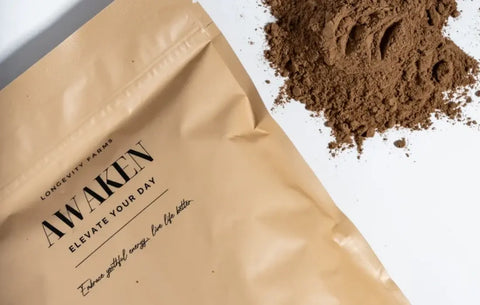Resveratrol is often hailed as a “longevity molecule,” a natural compound reputed to slow the aging process and promote overall health. Found in red wine, resveratrol first drew attention through the French Paradox, the observation of low heart disease rates despite a high-fat diet in French populations with regular red wine intake. Today, many people take resveratrol for longevity and general wellness, typically via a resveratrol supplement. But what exactly are the cellular mechanisms behind its effects? This article offers an examination of the cellular effects of resveratrol, explaining how it impacts key pathways associated with aging and health.

What is Resveratrol?
Resveratrol (3,5,4′-trihydroxy-trans-stilbene) is a type of polyphenol (stilbenoid) produced by plants as a defense against stress. Its rise to fame stemmed from studies suggesting it might mimic some of the benefits of calorie restriction, a proven strategy to extend lifespan in various organisms. Over the past two decades, research in test tubes, animals, and humans has linked resveratrol to a wide range of potential health benefits. These resveratrol health benefits include antioxidant and anti-inflammatory action, cardiovascular protection, neuroprotection, and even anti-cancer properties. Laboratory studies have found that resveratrol can neutralize harmful free radicals, reduce inflammation, improve blood flow, and inhibit tumor growth, among other benefits.
Resveratrol and AMPK: Activating the Cell’s Energy Sensor
One of the primary cellular targets of resveratrol is AMPK (AMP-activated protein kinase), a master regulator of energy metabolism. AMPK acts as an energy sensor in cells – it gets activated when energy levels are low (high AMP/ATP ratio) and in turn stimulates pathways that generate ATP while shutting down energy-consuming processes. Activating AMPK is generally beneficial for metabolic health and is also a known mechanism of lifespan extension (calorie restriction and exercise activate AMPK as well).
Resveratrol has been shown to be a potent activator of AMPK. In neuronal cells, resveratrol treatment caused a robust increase in AMPK activity, comparable to the effect of direct AMPK activators. Many downstream effects of resveratrol – such as improved mitochondrial function and neurite outgrowth – were cellular effects of resveratrol found to depend on the presence of an active AMPK pathway. Resveratrol “tricks” cells into thinking they are in a low-energy state, flipping on AMPK and related metabolic adaptations. By activating AMPK, resveratrol can shift the cell into a protective, energy-efficient mode: enhancing glucose uptake and fatty acid oxidation, and promoting the creation of new mitochondria. This mechanism is thought to underlie some of resveratrol’s benefits, like improved insulin sensitivity and anti-diabetic effects. It also links resveratrol to pathways of lifespan regulation, since AMPK activation is associated with longevity in multiple species.
Resveratrol and NAD+: Sirtuins and Cellular Aging
A key piece of the resveratrol puzzle involves sirtuins, particularly SIRT1, a protein deacetylase associated with longevity. Sirtuins require NAD+ (nicotinamide adenine dinucleotide) to function, meaning their activity is tied to the cell’s NAD+ levels. Research has shown a strong connection between resveratrol and NAD+ metabolism. Specifically, resveratrol can increase the bioavailability of NAD+ in cells, which in turn activates SIRT1. Activated SIRT1 then deacetylates target proteins that affect aging and metabolism.
One chain reaction goes like this: resveratrol elevates NAD+ and directly activates SIRT1; SIRT1 then deacetylates and activates the enzyme LKB1; activated LKB1 phosphorylates AMPK, boosting its activity. In this way, resveratrol establishes a positive feedback loop between SIRT1 and AMPK, two key regulators of health. This SIRT1-dependent mechanism was one of the earliest proposed explanations for resveratrol’s effect – essentially, resveratrol was described as a SIRT1 activator. By enhancing SIRT1, resveratrol could mimic calorie restriction at the molecular level, since calorie restriction also raises NAD+ and SIRT1 activity. SIRT1 influences numerous processes associated with aging. It influences gene expression, DNA repair, inflammation, and fat metabolism. Through SIRT1 activation, resveratrol may help improve glucose metabolism and insulin sensitivity, protect neurons and blood vessels, and promote stress resistance in cells.
Resveratrol and Mitochondrial Function
Mitochondria, the energy powerhouses of the cell, are central to aging and metabolism. Resveratrol appears to enhance mitochondrial function and even stimulate the production of new mitochondria. By activating AMPK and SIRT1 as described, resveratrol leads to downstream effects on energy regulators like PGC-1α, which is a master switch for mitochondrial biogenesis. Research in cells has shown that one mechanism by which resveratrol exerts its protective effects is through promoting mitochondrial biogenesis via AMPK activation. In other words, resveratrol and mitochondrial function are positively linked: cells exposed to resveratrol ramp up their mitochondrial capacity.
Practically, this can mean improved cellular energy production and metabolic efficiency. More mitochondria and healthier mitochondria enable cells to utilize nutrients more effectively and better handle stress. In muscle and liver tissue, for example, resveratrol has been observed to increase mitochondrial density and oxidative capacity, similar to what is seen with endurance exercise or calorie restriction. This mitochondrial boost may underlie benefits like improved endurance, fat burning, and protection against metabolic diseases.
Resveratrol and mTOR: Blocking a Growth Pathway
If AMPK is the cell’s fuel gauge, mTOR is the cell’s growth switch. The mTOR pathway (mechanistic Target of Rapamycin) promotes cell growth and protein synthesis when nutrients are abundant, but it also inhibits autophagy (the cell’s recycling process). Excessive mTOR activity is associated with aging and age-related diseases, whereas suppressing mTOR tends to extend lifespan in organisms.
Resveratrol has been found to antagonize the mTOR pathway, effectively dialing down the growth signals. By activating AMPK (which in turn can inhibit mTOR) and through other direct means, resveratrol ends up reducing mTOR activity. Resveratrol induces cellular cleanup (autophagy) by directly inhibiting the mTOR–ULK1 pathway. This means resveratrol and mTOR are functionally at odds: when resveratrol is present, mTOR’s activity is dampened. The benefit of this is that processes usually suppressed by mTOR (such as autophagy) get unleashed, which can help remove damaged components in cells. Lower mTOR activity is also linked to improved metabolic health and reduced inflammation.

Resveratrol’s Antioxidant Effects
One of the notable resveratrol antioxidant effects is its ability to reduce oxidative stress inside cells. It does this not only by chemical neutralization of ROS, but also by upregulating the body’s own antioxidant enzymes via signaling pathways (such as activating the transcription factor Nrf2 or the FOXO factors, which turn on genes like superoxide dismutase and catalase). By lowering oxidative stress, resveratrol may protect tissues from damage and slow down processes like inflammation and DNA damage that contribute to aging. For example, resveratrol has shown cardioprotective effects partly by inhibiting LDL cholesterol oxidation and improving endothelial function. In neurons, resveratrol’s reduction of oxidative damage is linked to its neuroprotective benefits, potentially helping to fend off neurodegenerative conditions.
Supplementing with Resveratrol: Dosage and Synergy
Given the promising cellular activities of resveratrol, it’s no surprise that many people choose to buy resveratrol powder or capsules as supplements. Resveratrol is available in various forms, including capsules, tablets, powdered resveratrol for mixing into drinks, and even functional beverages (sometimes referred to as an “anti-aging drink”) that combine resveratrol with other ingredients. When selecting a supplement, it is essential to consider both purity and form. There is no official recommended resveratrol dosage, but a common supplement dose is in the 250–500 mg per day range for general health. Starting with a lower dose (e.g., 100–200 mg) is advised, and people often take it with a fatty meal to aid absorption (since resveratrol is fat-soluble).
Importantly, resveratrol’s effects might be enhanced when combined with other complementary compounds. A popular pairing is NMN with resveratrol. NMN (nicotinamide mononucleotide) is a direct NAD+ precursor that boosts cellular NAD+ levels. As discussed, NAD+ serves as fuel for SIRT1, which is activated by resveratrol. By providing NMN and resveratrol together, the goal is to amplify SIRT1 and AMPK activation synergistically. An NMN resveratrol supplement could maximize the benefits of each ingredient – NMN ensures abundant NAD+ while resveratrol activates the sirtuin pathways that use NAD+.
For those interested in convenient formulations, one could even buy anti-aging drinks that include resveratrol alongside NMN and other longevity molecules. Longevity Farms offers a powdered drink called “Ageless Cocktail” that combines resveratrol, NMN, NAD+, and more in one blend. Such combinations aim to replicate a multi-faceted approach to cellular health: providing the building blocks (like NAD+ boosters) and the activators (like resveratrol) together. When supplementing with resveratrol, one should also be aware of the quality and source. Much of the supplemental resveratrol on the market is derived from Japanese knotweed (Polygonum cuspidatum), which contains trans-resveratrol. High-purity extracts are preferred. Due to the molecule’s rapid metabolism, some advanced formulations use liposomal encapsulation or co-administer piperine (from black pepper) to slow breakdown.
Before adding resveratrol supplements to your daily routine, it's essential to understand their potential safety implications and interactions. While generally considered safe for most, higher doses of resveratrol possess certain biological activities that warrant caution and careful consideration.
-
Blood Thinner Interactions: One critical interaction to consider is resveratrol's mild antiplatelet effect, which means it can subtly inhibit blood clotting. Individuals currently taking anticoagulant medications, commonly known as "blood thinners" (such as warfarin, aspirin, or clopidogrel), should be particularly aware. Combining resveratrol with these drugs could heighten the risk of bleeding or bruising, potentially leading to more significant blood thinning than intended by the prescribed medication. Careful monitoring by a healthcare provider is therefore crucial.
-
Hormone-Sensitive Conditions: Resveratrol also exhibits slight phytoestrogen activity, meaning it can mimic or modulate estrogen's effects in the body. Although its estrogenic activity is considered weak compared to pharmaceutical estrogens, this property could be relevant for individuals with hormone-sensitive conditions. Those with a history of certain breast cancers, endometriosis, or uterine fibroids should approach resveratrol supplementation with caution, as it might theoretically influence these conditions or interfere with hormone-related treatments.
-
Interference with Hormone Therapy: For individuals undergoing hormone replacement therapy or taking oral contraceptives, the phytoestrogenic properties of resveratrol warrant careful consideration. Consulting with a healthcare provider is highly recommended to assess any potential risks and ensure that supplementing with resveratrol will not negatively impact the efficacy of ongoing hormone-related therapies.
A healthcare professional's guidance is also critical for individuals with pre-existing medical conditions, as well as for pregnant or breastfeeding individuals. They can assess your unique health status and provide personalized advice regarding the appropriateness of adding resveratrol to your daily routine. This comprehensive evaluation ensures that the dosage, potential risks, and benefits of resveratrol supplementation align safely with your specific health needs and circumstances, mitigating any unforeseen complications.

Resveratrol’s reputation as a longevity molecule is built on a fascinating foundation of cellular biochemistry. It activates energy sensors (AMPK), boosts stress-response enzymes (SIRT1), promotes resveratrol and autophagy processes, inhibits growth pathways (mTOR), enhances mitochondrial function, and mitigates oxidative damage. Through these mechanisms, resveratrol causes cells to behave as if they are experiencing healthy stress (such as exercise or fasting), even when they aren’t – a concept known as a “caloric restriction mimetic.” This can translate into a range of health benefits, from metabolic improvements to potential neuroprotection and cardiovascular support. However, it’s important to keep expectations realistic. Resveratrol should be viewed as a helpful tool for supporting healthy aging, rather than a miracle cure. In the meantime, those interested in longevity can consider resveratrol as part of a broader strategy – alongside proper diet, exercise, and possibly other supplements like NAD+ precursors. Whether by sipping a glass of red wine or taking a capsule, leveraging the mechanisms of resveratrol offers a tangible way to engage our cells’ built-in anti-aging defenses. The longevity molecule from red wine has undoubtedly earned its place in the conversation about extending healthspan, one cell at a time.
Sources:
-
Resveratrol benefits, dosage, and more – Medical News Today medicalnewstoday.commedicalnewstoday.com
-
Resveratrol: A Double-Edged Sword in Health Benefits – MDPI (Molecules) pmc.ncbi.nlm.nih.govpmc.ncbi.nlm.nih.gov
-
PNAS (2007) – Resveratrol stimulates AMP kinase activity in neurons (Dasgupta et al.) pmc.ncbi.nlm.nih.govpmc.ncbi.nlm.nih.gov
-
Unraveling the AMPK-SIRT1-FOXO Pathway – Antioxidants (MDPI, 2025) mdpi.commdpi.com
-
Resveratrol induces autophagy by directly inhibiting mTOR – Scientific Reports (2016) nature.com
-
Linking CR to longevity through sirtuins and autophagy – Cell Death & Disease (2010) nature.comnature.com
-
NMN and resveratrol synergistically boost NAD+ – Pharmacol. Res. Perspect. (2022) pmc.ncbi.nlm.nih.gov




